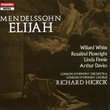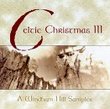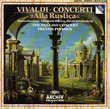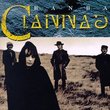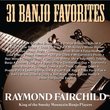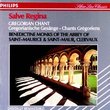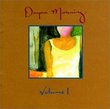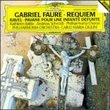| All Artists: Jon Banks;Matthew Spring;Sharon Lindo;Lisette Wesseling;Michelene Wandor;The Oxford Girls' Choir Title: Songs from the Taverne: Ballads & Drinking Songs from the Time of Chaucer Members Wishing: 2 Total Copies: 0 Label: The Gift of Music Original Release Date: 1/1/2003 Re-Release Date: 2/3/2005 Genres: Dance & Electronic, Folk, Special Interest, Pop, Classical Styles: Vocal Pop, Opera & Classical Vocal, Chamber Music, Symphonies Number of Discs: 1 SwapaCD Credits: 1 UPC: 658592105926 |
Search - Jon Banks;Matthew Spring;Sharon Lindo;Lisette Wesseling;Michelene Wandor;The Oxford Girls' Choir :: Songs from the Taverne: Ballads & Drinking Songs from the Time of Chaucer
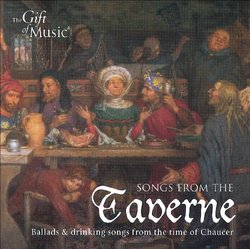 | Jon Banks;Matthew Spring;Sharon Lindo;Lisette Wesseling;Michelene Wandor;The Oxford Girls' Choir Songs from the Taverne: Ballads & Drinking Songs from the Time of Chaucer Genres: Dance & Electronic, Folk, Special Interest, Pop, Classical
Songs from the Taverne Ballads and songs from the age of Chaucer 'Where as with harpes lutes and gyternes They daunce and pleyen at dees bothe day and nyght' (The Pardoner's Tale) A selection of music chosen with Chaucer's... more » |
Larger Image |
CD DetailsSynopsis
Product Description Songs from the Taverne Ballads and songs from the age of Chaucer 'Where as with harpes lutes and gyternes They daunce and pleyen at dees bothe day and nyght' (The Pardoner's Tale) A selection of music chosen with Chaucer's pilgrims in mind, using instruments and music of the period, including those mentioned in The Canterbury Tales, such as lutes gitterns, harps and rebecs, and the carol 'Angelus ad Virginem' which was played by Nicholas the Oxford student in 'The Miller's Tale'. Jon Banks gittern and harp, dulcimer, percussion Matthew Spring lute, gittern, hurdy-gurdy, percussion Sharon Lindo rebec, medieval fiddle, pipes, pipe and tabor Lisette Wesseling French songs Michelene Wandor recorder The Oxford Girls' Choir 'In Flandres whilom was a compaignye Of yonge folk that haunteden folye, As riot, hazard, stywes, and taverns, Where as with harpes lutes and gyternes They daunce and pleyen at dees bothe day and nyght, And eten also and drynken over hir might, Thurgh which they doon the devel sacrifise Withinne that develes temple, in cursed wise, By superfluytee abhomynable.' (The Pardoner's Tale) Chaucer's 'Pardoner's Tale' opens with this description of Flemish youths drinking, over-indulging and carousing in the 'devil's temple' or tavern, playing the instruments which feature on this recording. Chaucer makes several further references to music and musical instruments. The fashionable and gallant Nicholas, an Oxford student, plays a 'gay sautrye' (psaltery) which he keeps above his bed. He uses this small harp to accompany himself singing 'Angelus ad Virginem'. The parish clerk, Absolon, is also musical and plays the rebec (a forerunner of the violin): 'And pleyen songs on a small rubible Therto he song somtyme a loud quynyble And as wel koude he pleye on a gyterne In al the toun nas brehous ne taverne That he ne visited with his solas' Perkyn Revelour, the apprentice in 'The Cook's Tale' loved dancing, dice, music and wenches! He could also 'pleye on gittern or ribible'. In 'The Manciple's Tale' the lute and gittern are both listed among the instruments of minstrelsy. The gittern is like a tiny lute, and its strings are plucked not by the fingers by a small plectrum. Pipes feature in so much medieval art that it seemed obvious that we had to include them here, along with the hurdy-gurdy, (mentioned in Chaucer as a 'symphonye'), that exotic-sounding instrument which was a strong feature of all musical life from the middle ages until the eighteenth century. Pipe and tabor, too, was a typical medieval combination. Both instruments are played by the same person (track 12), the tabor (drum) with the right hand, the pipe with the left - quite a feat of coordination! The music ranges from French songs - London's court life was conducted almost entirely in French in Chaucer's time, and the political ties between England and France were very close - to cheerful dances, and to reflective pieces for the magical combinations of lute and gittern or harp and gittern (tracks 19 and 21), the typical instrumental combination mentioned again and again in Chaucer's Canterbury Tales. Similarly Requested CDs
|
Member CD ReviewsReviewed on 11/18/2011... Quite lovely! Large selection of songs, played exquisitely on period instruments. Successfully avoids anachronistic modernisms. A real find.
|

 Track Listings (22) - Disc #1
Track Listings (22) - Disc #1
